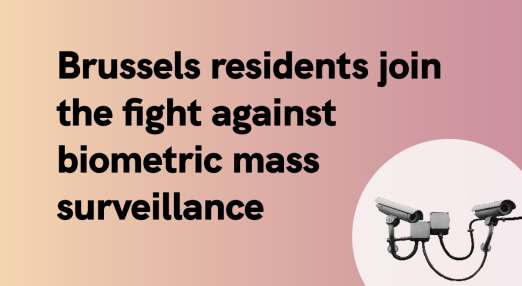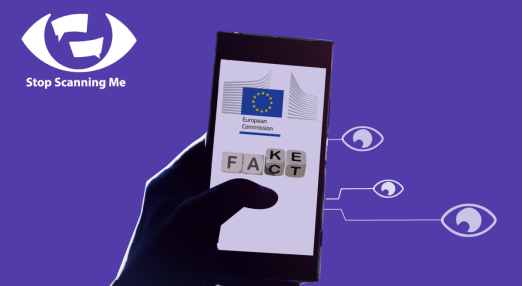Protect My Face: Brussels residents join the fight against biometric mass surveillance
The newly-launched Protect My Face campaign gives residents of the Brussels region of Belgium the opportunity to oppose mass facial recognition. EDRi applauds this initiative which demands that the Brussels Parliament ban these intrusive and discriminatory practices.
Filter resources
-

Protect My Face: Brussels residents join the fight against biometric mass surveillance
The newly-launched Protect My Face campaign gives residents of the Brussels region of Belgium the opportunity to oppose mass facial recognition. EDRi applauds this initiative which demands that the Brussels Parliament ban these intrusive and discriminatory practices.
Read more
-

Repression is really something different than prevention
In 2021, a 17-year-old boy in the Netherlands was arrested for inciting of riots. The boy had called for people to come to Utrecht with fireworks as a protest against the corona policy and the fireworks ban. The boy received a so-called "online area ban" from the municipality, even though the mayor does not have a legal basis for such an order. He was no longer allowed to make statements online that could lead to disorder in the city. Local rules do not provide majors the authority to curtail the freedom of expression as prevention, online or otherwise.
Read more
-

EDRi-gram, 29 March 2023
Last week, with a close circle of friends and supporters in Brussels, EDRi celebrated twenty years of defending and advancing digital rights across Europe. It was an evening full of reflecting on our journey and successes and also building hope and strategies for the future of Europe’s digital rights movement. A huge thank you to everyone who joined us for making the celebration truly special! In this edition of news from the digital rights world, read about a new Brussels-focused campaign against mass facial recognition. Residents of the Belgian capital can join the initiative and demand that the Brussels Parliament bans these intrusive and discriminatory practices. We also explore the concerning revelation that unverified information such as “social media profiles and phone contacts” are being used for the purpose of deportations, according to an internal European Commission assessment.
Read more
-

Who does the EU legislator listen to, if it isn’t the experts?
There's a huge gap between the advice given by experts on combatting child sexual abuse and the legislative proposal of the European Commission.
Read more
-

European digital identity – a potential game changer?
The foundations for a Europe-wide digital identity system are just about to be laid. Will Europe get it right and lead on this important topic? Will the EU set a global standard for the protection of sensitive user information and digital identities?
Read more
-

EDRi-gram, 15 March 2023
Last week, on International Women’s Day, EDRi’s Sarah Chander and Claire Fernandez were honoured as leading voices for change in the European Union and tech and digital rights space. Join us in celebrating them and all women! In this edition, amongst other digital rights updates, check out our position on the proposed European Health Data Space. This attempt by the European Union to better use health data could come at the cost of patients’ right to privacy and consent. You can also catch up with your favourite #PrivacyCamp23 sessions by reading the summaries below or watching the recordings online.
Read more
-

#PrivacyCamp23: Event summary
In January 2023, EDRi gathered policymakers, activists, human rights defenders, climate and social justice advocates and academics in Brussels to discuss the criticality of our digital worlds. We welcomed 200+ participants in person and enjoyed an online audience of 600+ people engaging with the event livestream videos. If you missed the event or want a reminder of what happened in a session, find the session summaries and video recordings below.
Read more
-

Poll: Young people in 13 EU countries refuse surveillance of online communication – Press Release
According to the results of the survey, 80% of young people aged 13 to 17 years old from 13 EU Member States would not feel comfortable being politically active or exploring their sexuality if authorities were able to monitor their digital communication, in order to look for child sexual abuse.
Read more
-

Position Paper: EU’s proposed health data regulation ignores patients’ privacy rights
EDRi’s new position paper outlines how the European Commission’s proposal for a European Health Data Space, in an attempt to make use of people’s health data, would sabotage the rights of patients to make decisions about their private medical information.
Read more
-

Poland: the government declares no further extension of data retention obligation
Data retention obligation will not be further extended in Polish law on electronic communication. However, the current, unlawful scope of telecommunication data retention remains unchanged.
Read more
-

Czech online state services without Google Analytics: thanks to IuRe
The Czech organisation Iuridicum Remedium (IuRe) sent an open letter to the Ministry of Health in June 2021. It was mainly about the vaccination system, but its impact is much bigger: many state websites are getting rid of Google Analytics and thus taking more account of user privacy.
Read more
-

European Commission must have greater ambition in combating sexual violence
Last year, the European Commission made a far-reaching proposal to protect children against sexual violence. But a study by Delft University shows that there is a lot wrong with the substantiation of the proposal.
Read more
